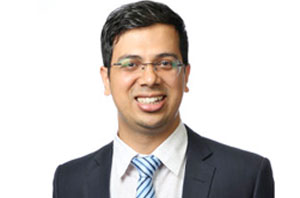Dr. Bishal Gyawali investigated how often cancer shrinks without treatment by looking at results from the placebo arm of randomized control trials.
When Dr. Bishal Gyawali prescribes treatment to newly diagnosed cancer patients, he is sometimes confronted with a tough question: “Could my cancer go away even if I don’t do treatment?”
He says some of his patients are wary of the side effects of treatments like chemotherapy, and some know a friend or relative whose cancer improved without treatment. So, they wonder if treatment is absolutely necessary.
“These are reasonable questions, and I realized I had no evidence-based way to answer them,” says Gyawali, a Medical Oncologist and Associate Professor at Queen’s University and OICR Clinician Scientist. “So, I decided I should look into it.”

Gyawali and colleagues reviewed results from 45 placebo-controlled randomized control trials (RCT) for drugs targeting advanced solid tumours in adults. In these RCTs, participants were randomly split into two groups: a treatment arm that received the treatment being trialed, and a control arm that received a placebo. Though the use of placebos is rare in cancer clinical trials, comparing results from a group that receives a drug versus a group that doesn’t can help understand what effect that drug has.
Since participants in the control arm of the trials Gyawali and colleagues analyzed only received a placebo – without any other active treatments – the progress of their tumours during the trial gives a good indication of how cancer responds without treatment.
Here, Gyawali tells OICR news about the results of their study and what they mean for clinicians and drug regulators.
What did you learn about tumour response among patients in the placebo arm of randomized trials?
We found that about one per cent of patients had some response from placebo alone. So yes, there is a chance a tumour will shrink without treatment. It’s a very small chance against a high-stakes disease like cancer. But it is possible. Beyond that, we also looked at ‘complete response’, meaning that a tumour disappears completely. We found there was almost a zero per cent chance of that happening with just a placebo.
How do you explain that some patients had tumours shrink while on a placebo?
We don’t know for sure. It could be the ‘placebo effect’ or it could be something a patient did outside of the trial that somehow affected their tumour.
In some trials, we saw a surprisingly high response rate in the placebo arm. The rate was about seven per cent in prostate cancer trials, which might be because prostate cancer patients are often given steroids in addition to cancer drugs. Sarcoma trials also had high response rates in the placebo arm, which is intriguing because sarcoma is usually difficult to manage. But it’s important to note that complete response was extremely rare without treatment. A tumour disappearing is a nearly unthinkable result from a placebo.
What does this tell us about how we should evaluate new cancer treatments?
In a few of the trials we examined, we saw response rates as high as 20 per cent in the placebo arm, which is higher than the response rates used by regulators to approve some new therapies. That’s important for regulators because, if a placebo can produce response in a tumour, the response rate from a single-arm trial that tests new cancer drugs can be misleading. I would suggest that approvals for new therapies should be based on RCTs, because we need to know the response rate in the control arm to truly understand the impact of a new cancer drug. If approval is granted from a single-arm trial, then it should be based on complete response rates rather than overall response rates because we know that complete response is almost always due to the drug.
How will these findings change your conversations with patients about whether to do treatment?
This gives me data to respond to patients who may question the value of doing treatment. We can have an unbiased, scientific conversation without discounting their opinions or experiences. I can tell them yes, there is about a one per cent chance your tumour will shrink without treatment, and basically no chance it will completely disappear. Is that a chance you’re willing to take?

